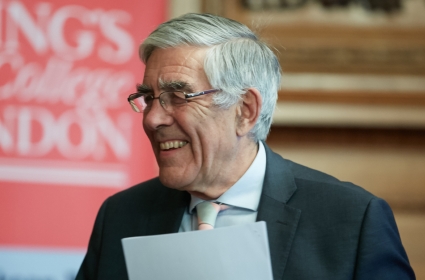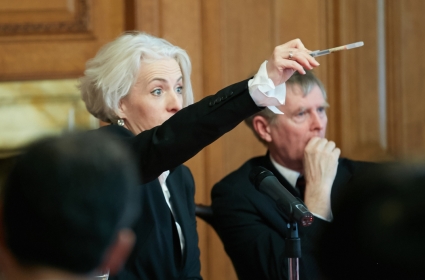The Human Rights Act: The Bill of Rights for the 21st Century?
On 24 March, The Dickson Poon School of Law, King’s College London hosted a high-level expert debate exploring the merits and problems of the 1998 Human Rights Act. The evening’s debate was chaired by Professor Aileen McColgan, Professor of Human Rights Law at King’s, and featured engaging commentary and debate by four leading experts in the field:
- Lord Phillips of Worth Matravers, former president of the Supreme Court and Dickson Poon Distinguished Fellow and Visiting Professor in The Dickson Poon School of Law
- Martin Howe QC, a member of the Government’s Commission on a Bill of Rights for the United Kingdom
- Dr Colm O’Cinneide, General Rapporteur of the European Committee of Social Rights and Reader in Law at University College London
- John Wadham, former chief executive of Interights and Liberty, and Senior Visiting Research Fellow in The Dickson Poon School of Law.


Lord Phillips began the debate by setting it within its historical context. He reminded the audience that King John never intended to respect Magna Carta. It was never signed, only sealed, and the most iconic sections which we still celebrate, like the right to a fair trial, due process and the prohibition of torture were not the most prominent in the original document. Indeed they only became well established in the 17th century, through the influence of judges such as Sir Edward Coke. Observing the United Kingdom’s prominent role in the creation of the European Convention of Human Rights, he pointed out that the Human Rights Act had been introduced to give British judges more opportunities to comment on the ambit of Convention rights in cases that could be dealt with domestically - it would be a mistake, in his view, for the UK to withdraw from the European Convention of Human Rights system, which required an ultimate adjudicative authority, even though the Strasbourg Court engaged in ‘judicial dialogue’ with domestic Courts, and though the UK Supreme Court retained the power to decline to follow Strasbourg’s jurisprudence. In withdrawing, he warned, the UK would stop being an example for the rest of the world. ‘I have yet to see a draft Bill of Rights; but in principle I am not in favour [of such a proposal],’ he said.
John Wadham followed suit by highlighting the positive impact that the Convention - and the Human Rights Act that incorporated it – had in the protection of the most vulnerable in society, precisely those who are often vilified in the tabloid press and therefore need human rights most. In his view the conservative proposals for repealing the Human Rights Act are deeply problematic and heavily exaggerate the interference of the European Court into UK’s domestic affairs. Drawing on his expertise as a practitioner using the Human Rights Act, he pointed out that the purpose of human rights was always to protect those whom the majority of people did not want to protect, and said, ‘the proposals undermine entirely the principles that underpin international law and represent an failure of ambition by the Conservative Party on the global promotion of human rights.’ He concluded that ‘the bill of rights we have is the Human Rights Act, and the bill of rights we need is the Human Rights Act.’
Martin Howe QC strongly defended the proposals claiming that the European Court and domestic judges have gone well beyond their remit by unduly expanding the scope of the Convention through activist judgments that disrespect the democratic right of peoples, through their Parliaments, to implement policies, and exceed the original intention of the drafters. ‘There is a constitutional deficit in that the states that are party to this Convention never conferred this law-making power on the Strasbourg Court,’ … we find ourselves being bound by a different Convention as “interpreted”' by the judges, he said. The Conservative Party's solution, therefore, is to negotiate changing the convention to make the Court’s decisions only advisory or, failing that, to withdraw from the treaty.

The final speaker, Dr Colm O’Cinneide, passionately contested Mr Howe’s arguments, warning against the ‘carelessness’ of the conservative proposals with the reputation and standing of the UK in the international community as a standard-bearer of human rights protection. He also argued that a ‘living instrument’ interpretation of the Convention had become established practice from the 1970s Following Martin’s logic, the notion that if the court does something that Parliament doesn’t like, then this is an intolerable burden on democratic rule of Britain … I would expect the next Tory government in the UK to withdraw … from any form of extraterritorial adjudicative mechanisms that could in some ways be seen as constraining parliamentary power.’ He concluded: ‘it is careless in terms of the messages it conveys about rule of law, about convenience, about the attitude that countries should adopt toward international courts’ decisions. There is a dreadful carelessness about this proposal and I think it should be subject to a very very serious scrutiny.’
The lively Q&A session that followed showed an audience divided, although generally in favour of keeping the Human Rights Act. The event confirmed, if confirmation was needed, that the topic will certainly be one of the most interesting and controversial points of dispute in and after the coming general elections.
The Parliament Chamber at Inner Temple, steeped in 600 years of history, provided the perfect setting for the event, part of the 800th Anniversary of Magna Carta celebrations, attended by a diverse and engaged audience of more than 120 people including students, academics, NGO representatives and members of the press and the general public.